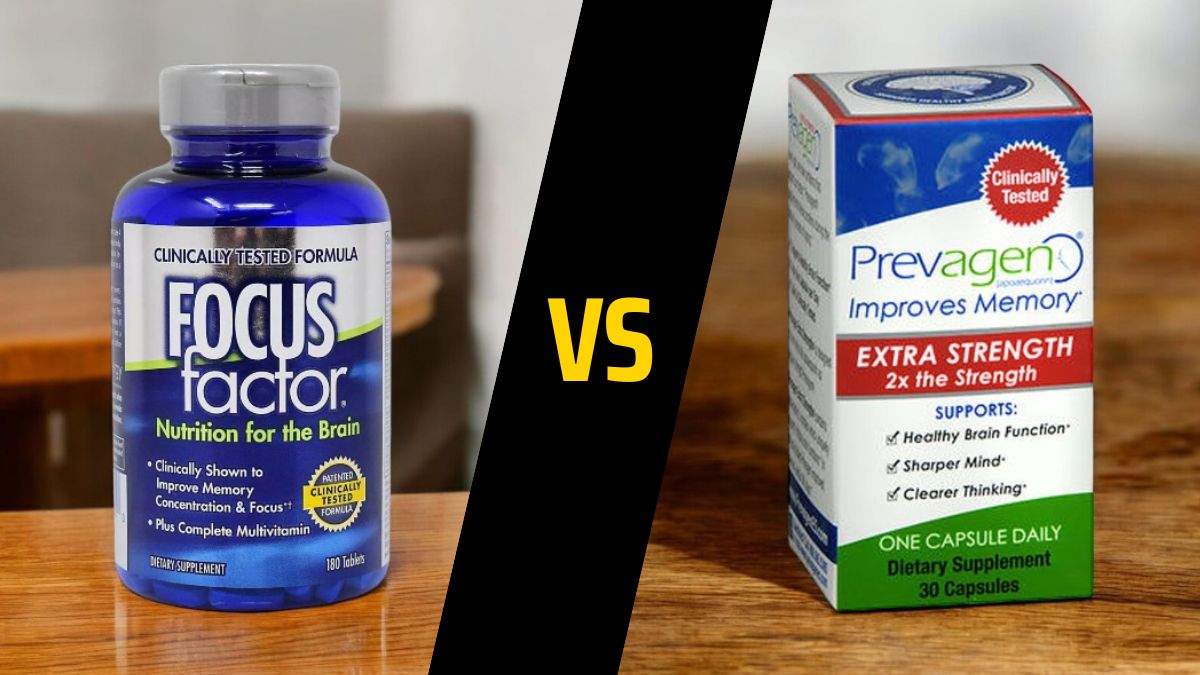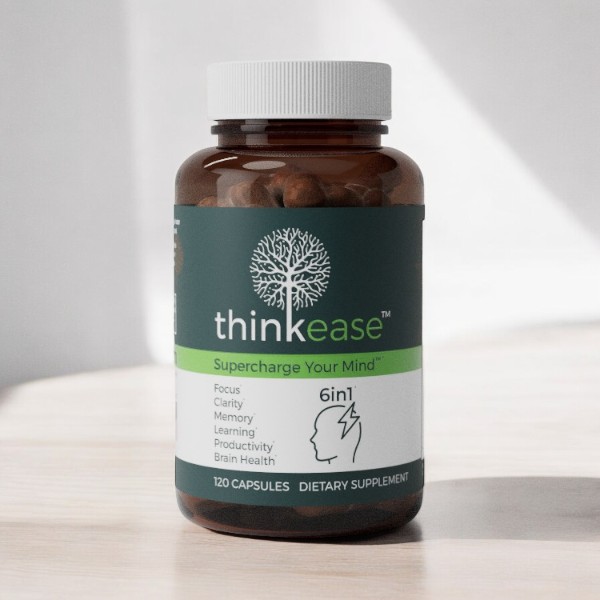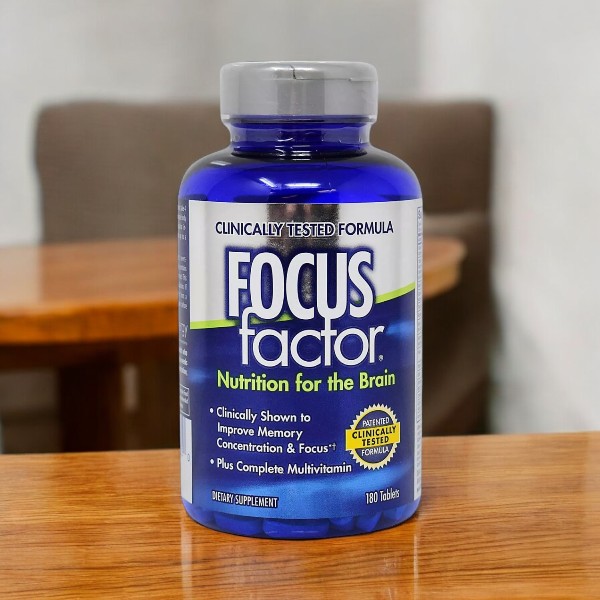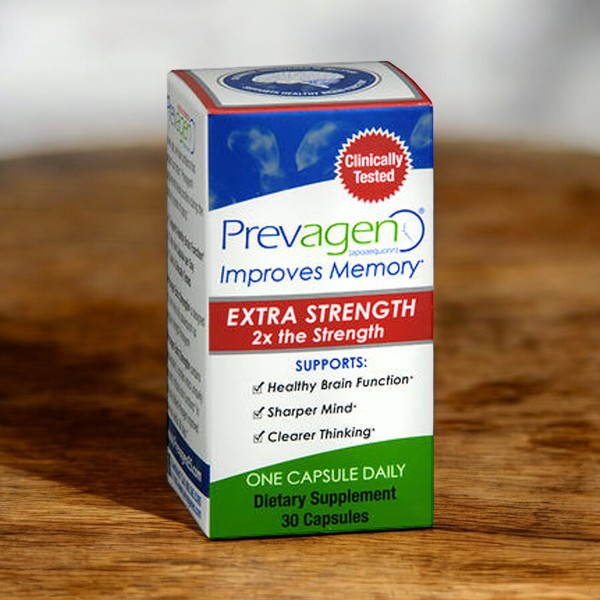Focus Factor vs Prevagen - Which Is Most Effective?

By Richard Davidson, October 22 2025
If you’re trying to sharpen memory, focus, or mental clarity, the right brain supplement can help. Most of these products blend several nootropic ingredients into one formula. Two things matter. First, dose: an ingredient only tends to work at the amounts shown effective in solid studies. Second, evidence: some products lean on ingredients that simply don’t have good support.
That’s the backdrop for my look at Focus Factor vs. Prevagen. Both have problems. Focus Factor includes a few known ingredients, but the amounts look too light to expect much. Prevagen leans on an ingredient that isn’t convincingly backed for memory or focus in the first place. There are better-designed options out there; I’ll point to those after walking through where these two fall short.
Results And Recommendation
- Neither Focus Factor or Prevagen were effective in use - a scientific assessment of their formulations reveals few nootropic ingredients and many ingredients present in too low amounts.
- Much of Focus Factor's ingredient list is comprised of basic multi-vitamin ingredients with no significant cognitive benefit.
- Prevagen lost a major legal challenge in December 2024 which ruled the supplement has no memory of cognitive benefits.
- Far more effective brain supplements are available. The best in my research and testing is currently ThinkEase. It uses a broad spectrumof proven brain boosting ingredients, it's transparently formulated and uses the latest scientific research. I found it to be highly effective in supporting memory, increasing focus and reducing brain fog.

What Is Focus Factor?
Focus Factor claims to be able to improve memory, concentration and focus, whether it actually does is something I'll clarify in my analysis below. The brand is owned by Synergy CHC after being aquired from the founding company in 2015. The brand has been around for 20 years or so and appears to be widely available as a consequence of this, rather than due to the product's effects, which are limited as I'll come on explain. It is true to say that Focus Focus does include a wide range of ingredients, but it's more of a multi-vitamin with inadequate amounts of some nootropic ingredients, rather than a high-powered nootropic. If you're looking for noticeable improvements to memory, concentration and focus there are much more effective options available.

What Is Prevagen?
Prevagen's makers, Quincy Bioscience, make many claims about their product's effectiveness but much of this is unfounded, unproven or legally contested. Nonetheless, as a brief overview of what Prevagen is, or claims to be, the product is positioned as a memory supplement first and foremost. At least it was until a series of legal rulings contesting the manfacturer's claims led them to remove many untrue or unproven statements about the product. The manufacturer's own website now has no claims about the effectiveness of the product instead simply claiming it's 'unique' and uses (a completely unproven) ingredient apoaequorin. Apoaequorin isn't a recognized nootropic ingredient and hasn't been studied as a brain supplement in any meaningful way. So, unique? Yes. Effective? No. It's also worth being aware that the small amount of active (albeit ineffective) ingredients in Prevagen are so small in volume, that the majority of the capsule contents is filler material, comprised of maltodextrin, magnesium stearate, modified corn starch, salt, soy and sugar. Certainly not ingredients I want to consume - and certainly not ingredients that are in any way beneficial for the brain.

Do Neuriva and Prevagen Really Work? Scientific Studies And Results
Focus Factor
Focus Factor repeatedly claim their product has been clinically studied and that the research shows their product works. I managed to track down the research document [1] and study its contents in detail. I'd strongly suggest the manufacturer's reliance on any claims associated with this study are treated with caution for the following reasons. Firstly, the study conducted on 96 people was paid for by the manufacturer, which is likely to introduce a bias effect. More importantly however, the study only shows one positive result - that individuals were able to remember two more words after taking the product than before. However, this is likely to be as a result of a practice effect - as the placebo group saw a similar improvement. It's also extremely dubious that the manufacturer uses this single measure to claim a 20 year reduction in brain age. This is simply nonsense. It also worth noting that the same piece of research found no improvements at all to reaction time, recall or vigilance. So in summary, any improvements from taking Focus Factor were found to be modest, even if we disregard all the issues with the study. It's also worth noting that the same report found an increase in headaches in the test group.
Prevagen
For a long time Prevagen made unsupportable claims about its product. The claims made suggested that Prevagen improves memory - these claims have been successfully challenged in various legal actions. These have included legal action against Prevagen's maker by the Federal Trade Commission and the New York State Attorney General. Many of Prevagen's misleading claims relied on a piece of research called the Madison Memory Study [2]. This flawed piece of research was paid for by Quincy Bioscience which likely introduced bias. The study looked at the effects of Prevagen and apoaequorin on adults who self-identified as having memory difficulties. The study used 218 participants but found no significant improvements in cognitive performance at all. However, clever statistical manipulation of the results after the study found an angle from which to build a claim - one sub-group of minor impaired younger individuals may have seen a modest change in verbal learning and memory. This is likely to be a statistical oddity and in part due to a practice effect, or placebo but Prevagen leveraged it as the basis for numerous misleading claims. Furthermore, the study lacked any pre-specified sub-groups (validating the point above), had potential for false-positives due to multiple comparisons being made without proper statistical adjustments.
It's also worth noting at this point, that apoaequorin isn't recognized in the scientific community as a nootropic ingredient. It also isn't believed to be bioavailable as it doesn't cross the blood-brain barrier. In summary Prevagen appear to still be trading on perceptions of its effectively based on years of misleading claims. Even though those claims are no longer being made after successful legal challenges, the claims made unfortunately remain in many consumer's minds.
Focus Factor And Prevagen Ingredients
- Multi-vitamin: Vitamin A (1200 mcg), Vitamin C (250 mg), Vitamin D (2.5 mcg), Vitamin E (20.1 mg), Thiamin (3 mg), Riboflavin (1.7 mg), Niacin (25 mg), Vitamin B6 (15 mg), Folate (400 mcg), Vitamin B12 (20 mcg), Biotin (300 mcg), Pantothenic Acid (12 mg), Choline (30 mg), Calcium (50 mg), Iron (5 mg), Iodine (15 mcg), Magnesium (100 mg), Zinc (10 mg), Selenium (50 mcg), Copper (0.4 mg), Manganese (2 mg), Chromium (100 mcg), Molybdenum (10 mcg), Potassium (50 mg)
- Proprietary Blend: L-Glutamine, Bacopa Monnieri, DHA, Phosphatidylserine, Huperzine A, Ginkgo Biloba, Dimethylaminoethanol (DMAE), L-Tyrosine, Bilberry Extract, Grape Seed Extract, Korean Ginseng, Inositol, Alpha-GPC, Boron (660mg)
- Other ingredients: Dicalcium Phosphate, Microcrystalline Cellulose, Croscarmellose Sodium, Stearic Acid, Pharmaceutical Glaze, Magnesium Stearate, Silica
- Contains: Fish (Anchovy, Sardine, Salmon), Soy
- Vitamin D (50mcg), Apoaequorin (10mg)
- Other ingredients: Microcrystalinecellulose, Vegetable Capsule, Maltodextrin, Casein Peptones, Lactose, Magnesium Stearate, Modified Corn Starch, Salt, Soy Peptones, Sugar.
- Contains: Milk, Soy, a bioengineered food ingredient.
Focus Factor And Prevagen Ingredients Versus Top Brain Supplement (ThinkEase)
Ingredient | Focus Factor | Prevagen | ThinkEase |
|---|---|---|---|
Vitamin B6 | None | None | 2.5mg |
Vitamin B9 | None | None | 100mcg |
Vitamin B12 | None | None | 7.5mcg |
Acetyl L-Carnitine | None | None | 750mg |
Lion's Mane | None | None | 550mg |
Bacopa Monnieri | Undisclosed (likely ineffective) | None | 300mg |
N-Acetyle L-Tyrosine | Undisclosed (likely ineffective) | None | 275mg |
Citicoline | None | None | 250mg |
L-Theanine | None | None | 200mg |
Rhodiola Extract | None | None | 200mg |
PQQ | None | None | 10mg |
Lutein | None | None | 10mg |
Phosphatidylserine | Undisclosed (likely ineffective) | None | 100mg |
Pine Bark Extract | None | None | 75mg |
Zeaxanthin | None | None | 2mg |
Multi-vitamin | 549mg | None | None |
Ginkgo Biloba | Undisclosed (likely ineffective) | None | None |
Korean Ginseng | Undisclosed (likely ineffective) | None | None |
L-Glutamine | Undisclosed (likely ineffective) | None | None |
DHA | Undisclosed (likely ineffective) | None | None |
Huperzine A | Undisclosed (likely ineffective) | None | None |
Dimethylaminoethanol | Undisclosed (likely ineffective) | None | None |
Bilberry Extract | Undisclosed (likely ineffective) | None | None |
Grape Seed Extract | Undisclosed (likely ineffective) | None | None |
Inositol | Undisclosed (likely ineffective) | None | None |
Alpha-GPC | Undisclosed (likely ineffective) | None | None |
Boron | Undisclosed (likely ineffective) | None | None |
Vitamin D | None | 50mcg | None |
Apoaequorin | None | 10mg | None |
Clean Ingredient Profile | No | No | Yes |
Premium Grade Capsule | No | No | Yes |
Scientific Basis
Focus Factor
There's a big discrepancy in how Focus Factor positions itself and what the product actually contains. Half of the contents in Focus Factor are just basic multi-vitamins, the same ingredients any $5 drug store multi-vitamin contains. The other half of Focus Factor is comprised of nootropic substances - but the amounts of each ingredient is hidden. Focus Factor's decision to hide the amounts of these ingredients is due to many, if not all, of them being severely underdosed. In other words the amount of each ingredient included in Focus Focus is far below the amounts shown to be needed to provide meaningful benefits for the brain.
As far as the ingredients themselves are concerned, B6, B12 and Folate can support neurotransmitter function [3]. The amounts in Focus Factor are in line with standard multi-vitamin products. Magnesium and zinc are helpful for brain function, but the amounts in Focus Factor are too low to create any cognitive benefits [4]. Iron if overdosed can increase oxidative stress, it may therefore worsen cognitive function [5], it therefore doesn't make sense to me why Focus Factor includes it.
The opaque proprietary blend is hard to properly assess. This lack of transparency is a red flag for for me, but I can still draw some clear conclusions. The total amount in this part of Focus Factor's formula is far below the amount that would be necessary for the ingredients to all be dosed at effective levels. Many if not all of the ingredients simply won't do anything if they're under-dosed - which they are. Bacopa Monnieri requires a 300mg dose to be effective [6], Phosphatidylserine requires 100mg [7], Huperzine A needs 200mcg - but critcially isn't recommended for on-going supplementation (for safety reasons it shouldn't be taken for more than 6 months) [8], Alpha-GPC requires 600mg to be effective - almost as much as the entire proprietary blend [9].
Just as importantly, Focus Factor is missing the most effective nootropic ingredients - including Acetyl L-Carnitine, Citicoline, Rhodiola Rosea, Lions Mane and L-Theanine.
Prevagen
Prevagen is the only brain supplement to use apoaequorin. The brand falsely linked this ingredient to memory improvement for many years, but legal challenges have now stopped Prevagen from making misleading claims over the product's effectiveness. As I've discussed the single study into Prevagen's effectiveness is highly flawed and it's not a brain supplement ingredient supported by any meaningful scientific evidence. Apaoequorin is a calcium binding protein derived from the jellyfish Aequorea Victoria [10]. As I've briefly mentioned, there's a lack of evidence into this ingredient's benefits for the brain and what's more research suggests it's digested as any other protein and therefore can't reach of affect the brain [11]. Prevagen's only other ingredient (beyond apoaequorin) is just regular Vitamin D [12] - and a very modest amount at that. What we're therefore left with is a basic product with two low cost ingredients, neither of which are proven to be capable of making any meaningful improvements to cognitive performance, let alone memory.
Also as I've touched on, Prevagen's claims have been ruled as misleading and recent court rulings (December 2024) [13] have clearly stated that Prevagen does not improve brain function or memory and that the brand must cease making deceptive claims.
Qualitative Review of Focus Factor's Efficacy
Focus Factor
I personally took Focus Factor for 6 weeks, precisely as directed. My expectations were fairly tempered after seeing the ingredient profile but I remained open-minded. During the first few days I couldn't discern any difference, which was as expected as many nootropics take several days before their effects start to accumulate and become obviously noticeable. After a week I still couldn't identify any improvements, something I would normally notice from Choline, Bacopa and Gingko - but the absence of any effects suggests my concern that these ingredients are present in meaningful amounts appeared to be validated.
By the third week I did notice a modest improvement to mental clarity and perhaps verbal recall, but I reiterate it was modest. I' suggest it was broadly comparable to what might be experienced from a standard B-Vitamin complex, perhaps slightly more. However, it certainly wasn't equivalent to a real nootropic effect. I couldn't discern any increase to my focus levels, memory or thinking skills. These are things that I do notice with more comprehensively formulated and correctly dosed nootropic supplements.
Overall, I'd sum up my experience with Focus Factor as underwhelming. The few modest benefits I encountered suggest that most, or perhaps all of the ingredients in Focus Factor's proprietary blend are present in insufficient amounts. I'd sum up Focus Factor as an expensive multi-vitamin with a minor cognitive perk, at best.
Qualitative Review of Prevagen's Efficacy
Prevagen
I tested Prevagen for 9 weeks in total. I had some reservations, not just because of the concerns I have with the brand and its parent company, but also because of the limited studies into its main ingredient apoaequorin. The brand claims it's safe and cites several sponsored studies, but I still felt uneasy. For the first week I experienced no effects whatsoever - no shift in focus, memory or mental clarity. During the second and third weeks I still didn't experience anything, absolutely nothing at all. My suspicion that anyone reporting improvements is likely to be seeing the placebo effect seemed validated. The lack of results was frustrating as many effective alternatives are available - most notably supplements which incorporate Lions Mane, Acetyl L-Carnitine or Phospahtidylserine for example.
Into the fourth week there were still no clear effects. I continued to use the product for a further 5 weeks, but still didn't experience anything attibutable to the product at all. That means no improvements to memory or general recall, not increase in focus and no reduction in brain fog.
It's no exaggeration to say that Prevagen is one of the least effective brain supplements I've tested. The lack of any clinically proven ingredients, combined with what we now know to be deceptive claims over many years makes it a product I would suggest is best avoided. There are far, far more effective products available.
Estimate of Efficacy Relative To Similar Products
Dosage:
Focus Factor's total serving size is 4 capsules, but there's an insufficient amount of active ingredients to justify this many capsules. Half of Focus Factor's ingredients by weight are simply standard multi-vitamin ingredients, the other half are seemingly under-dosed nootropic ingredients. Prevagen's serving size is just a single capsule, but the amount of active ingredients is extremely small.
Quality:
It's all but certain that both brands use too little of the wrong ingredients and much of the capsules' contents is filler rather than worthwhile nootropic substances. Both brand use filler ingredients in their capsules which I actively try to avoid - especially Magnesium Stearate and Maltodextrin. Prevagen even goes as far as to fill its capsules with salt and sugar. Both I would have to rate as low quality when compared with the best brain supplements available.
Efficacy:
I found both Focus Factor and Prevagen to be disappointing in practice. I wasn't completely surprised given the major issues with the ingredients and amounts of each ingredient in both products - but I was perhaps still more disappointed than I'd expected. Focus Factor does provide a reasonable range of vitamins in its product, but it amounts to a very expensive basic multi-vitamin, I acknowledge there was a very modest cognitive benefit too, so on that basis it has a small edge on Prevagen. Prevagen I'd consider to be completely ineffective and a waste of money, however I'd caveat this is a personal view backed-up with my own experience and professional assessment. It is worth noting again that Prevagen has been found in a court of law to not support memory of cognition in any way - no more needs to be said.
When compared with real nootropic supplements, the poor performance of Focus Factor and Prevagen as brain supplements is very apparent. Comprehensive nootropic supplements like ThinkEase, the top-rated product in my testing, is a far better option in my view.
Cost:
Focus Factor costs $24.99 but up to $39.99 for the premium Extra Strength variant which offers no tangible performance improvement, but do cost more. Prevagen costs $40 for 30 capsules. Neither product offers good value for money given the poor results when compared with the best products available.
Safety Considerations and Potential Side Effects
Focus Factor and Prevagen are both generally safe but some moderate side effects may be experienced by some users. Prevagen's own research highlighted headache issues and I also experience some mild headaches during my trial which may have been attributable to Prevagen, but I can't be certain.
Results And Recommendation
- Neither Focus Factor or Prevagen were effective in use - a scientific assessment of their formulations reveals few nootropic ingredients and many ingredients present in too low amounts.
- Much of Focus Factor's ingredient list is comprised of basic multi-vitamin ingredients with no significant cognitive benefit.
- Prevagen lost a major legal challenge in December 2024 which ruled the supplement has no memory of cognitive benefits.
- Far more effective brain supplements are available. The best in my research and testing is currently ThinkEase. It uses a broad spectrumof proven brain boosting ingredients, it's transparently formulated and uses the latest scientific research. I found it to be highly effective in supporting memory, increasing focus and reducing brain fog.

Overall Assessment
Focus Factor and Prevagen are both ineffective brain supplements for the most part. Focus Factor, whilst comparatively well-known doesn't have a formulation that can reasonably be expected to provide any significant cognitive benefits in practice - as indeed proved to be the case during my test period. Similarly, but in many ways worse was Prevagen. Not only does the product fail to use any proven brain boosting ingredients, the brand has been told in a court of law that their product mustn't make any claims relating to memory or cognitive performance. In my extended trial I couldn't discern any benefit whatsoever.
If you're wanting, or needing a supplement to help improve your cognitive health or mental performance my strong advice would be to choose one of the best products now available. These supplements follow the latest clinical research when formulating their products. The best performing brain supplement in my own tests is currently ThinkEase. It uses more ingredients than most others and even more critically every ingredient is provided in the amounts recommended by the latest scientific studies. I found it made meaningful improvements across most areas of cognitive performance including memory, focus and mental clarity.
References and Further Reading
https://cdn.shopify.com/s/files/1/1774/9147/files/S001._Executive_Summary_of_FOCUSfactor_Clinical_Study_Report.pdf?8914691632562379084
https://www.researchgate.net/publication/294750848_Effects_of_a_Supplement_Containing_Apoaequorin_on_Verbal_Learning_in_Older_Adults_in_the_Community
- https://pmc.ncbi.nlm.nih.gov/articles/PMC6888477/
- https://pubmed.ncbi.nlm.nih.gov/23950577/
- https://pubmed.ncbi.nlm.nih.gov/14633776/
- https://pmc.ncbi.nlm.nih.gov/articles/PMC3153866/
- https://cris.maastrichtuniversity.nl/ws/portalfiles/portal/1485834/guid-2a8dcf0a-27fd-4e02-a4cd-60d6b3539c47-ASSET1.0.pdf
- https://journals.plos.org/plosone/article?id=10.1371/journal.pone.0074916
- https://jissn.biomedcentral.com/articles/10.1186/1550-2783-12-S1-P41
- https://www.webmd.com/healthy-aging/apoaequorin-what-to-know
- https://www.alzdiscovery.org/uploads/cognitive_vitality_media/Apoaequorin-Cognitive-Vitality-For-Researchers.pdf?utm_source=chatgpt.com
- https://pmc.ncbi.nlm.nih.gov/articles/PMC6132681
- https://www.ftc.gov/news-events/news/press-releases/2024/12/statement-ftcs-win-lawsuit-against-makers-dietary-supplement-prevagen
